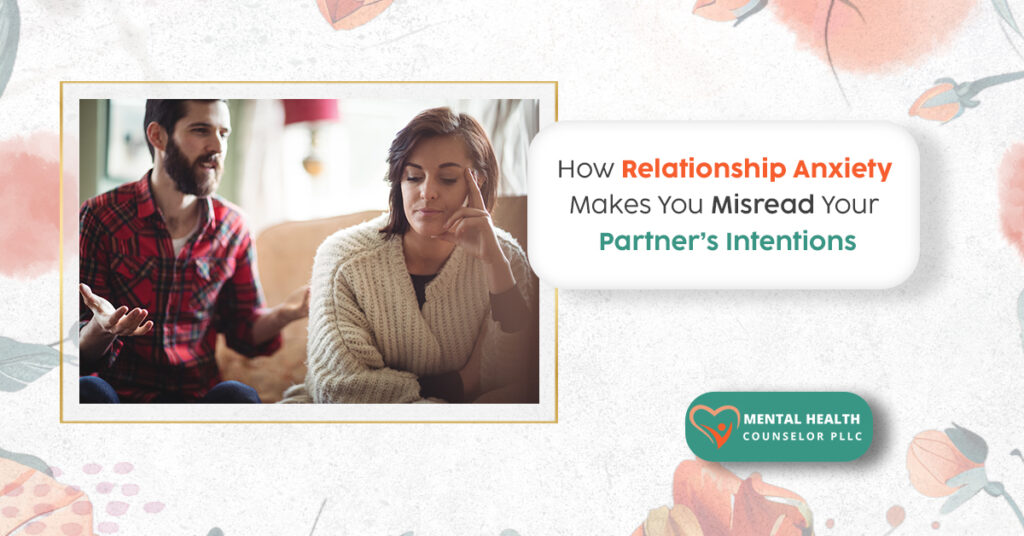
Relationship anxiety is known to play tricks on your perception of reality.
One moment, you notice your partner is busy texting someone, the next moment you are so sure they have started losing interest in you.
It leaves one feeling drained and confused inside, with a lot of second-guessing about the entire relationship.
Anxiety is never playing fair. It takes a perfectly neutral situation and paints the worst possible picture.
Hypervigilance is what occurs in your brain when you are anxious about your relationship. It’s when you are constantly on the alert to threats, both real and imaginary.
What Relationship Anxiety Really Does To Your Brain
When anxiety kicks in, your amygdala (the brain’s fear center) goes into overdrive.
It is supposed to protect you, but it cannot tell the difference between an actual threat and what is perceived to be a threat.
When your partner is not talking as much as they normally do, your brain reacts by thinking that there is something wrong.
This brings about a negative interpretation bias as defined by psychologists. In essence, you are wired to assume the worst.
You fill the gaps in your mind with fictional accounts of a catastrophe rather than giving your partner the benefit of the doubt.
Anxiety thrives on uncertainty. That is the rotten core of the problem.
Relationships are full of ambiguous moments, texts that take longer to answer, plans that vary and moods that change.
Anxious minds grab these instances and transform them into apparent pieces of evidence that something is amiss.
Common Ways You Might Misinterpret Your Partner
Relationship anxiety shows up in patterns. You might not even realize you’re doing it until someone points it out. Here are some of the most common misreadings:
- Reading tone into text messages. If they are busy, a short text message appears cold
- Distance Means Disinterest. Alone time interpreted as rejection. They need some alone time, and you immediately interpret it as rejection.
- Catastrophizing Small Conflicts. You think the whole relationship is falling apart because of one small disagreement
- Mind Reading. Knowing what they’re thinking without actually asking them
- Seeking Reassurance. Being constantly assured or confirmed about something pushes them away from you
Attachment patterns play a role. They are, therefore, self-fulfilling prophecies. The more reassurance is sought, the more exhausted the partner becomes.
The worse things are assumed, the more defensive interactions become.
The Role of Attachment Patterns
The attachment style is a major factor that determines the manifestation of relationship anxiety. When you formed an anxious attachment style during childhood, you probably learned that love is not always predictable.
Perhaps your caregivers were inconsistent, or you had to struggle to get their attention.
It carries over into adult relationships because, on some level, you know very well that abandonment is coming and you are constantly looking out for signs of it within a relationship.
Even when one of the partners may be acting perfectly reasonably, behaviors are interpreted through that lens.
Individuals with secure attachment styles are able to assume things at face value most time. In the case of anxious attachment, each interaction carries something different.
You do not simply react to the present situation; you react to all the times preceding this situation, when you feel that you were abandoned.
Stopping and Breaking the Cycle of Misinterpretation
The good news is can rewire these patterns. It takes work, but it’s absolutely possible.
Practice reality-testing your thoughts:
- What evidence do I have that supports my interpretation?
- What evidence do I have that maybe does not support my interpretation?
- Are there other causes for the way my partner is acting?
- What would I tell a friend in this situation?
Yes, communication is important. It must be the appropriate form of communication.
Read more: 5 Signs Your Relationship Is Suffering from Poor Communication
When to Get Support from A Professional
Relationship anxiety is sometimes too much to manage by yourself.
Therapy can support you when:
- You are consistently angry
- When worry is ruining your relationship
- When you struggle to change patterns on your own
Those distorted thoughts are treated using cognitive-behavioral therapy. It works particularly well for anxiety.
You come to actually notice the existence of these patterns and question them through a more balanced form of thinking.
The right therapist will collaborate with you in order to comprehend what is behind this anxious feeling and provide you with the tools to establish the safe relationship that you rightfully deserve.
Your Relationship Deserves Peace
You don’t always need to assume that your relationship is in crisis.
Through therapy, you can learn to trust yourself and your partner to a greater extent.
Our therapist team at Mental Health Counselor PLLC has experience in treating relationship anxiety as well as attachment and communication problems with individual or couples dynamics.
We provide face-to-face and safe video sessions. This means that therapy will be conducted in a more convenient way, considering your schedule and needs.
Book a therapy session today that can be the beginning of the safe and peaceful relationship that you have been working so hard to achieve.
Contact us today to schedule your appointment.
FAQs
Is relationship anxiety the same as trust issues?
Not really. Trust issues mostly develop as a result of someone’s specific betrayals, while anxiety in a relationship has more to do with an attachment style and general fear of abandonment.
They can be connected.
How do I know if my anxiety is justified or if I’m overreacting?
Begin by discussing with your partner. You may also want to seek the opinion of a therapist. Should your fears and doubts continue in the absence of any supporting evidence or after being reassured, then most probably it is just anxiety playing tricks on you.
